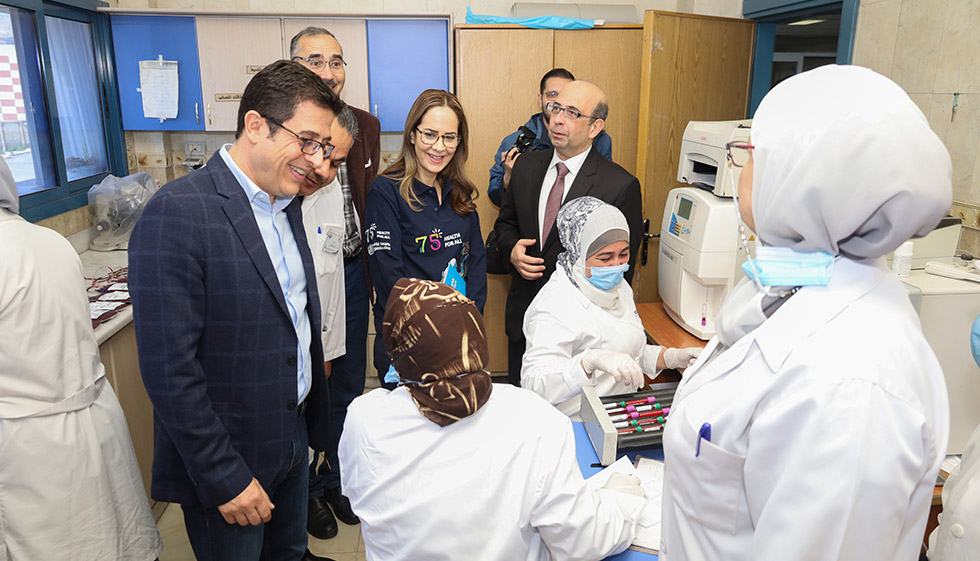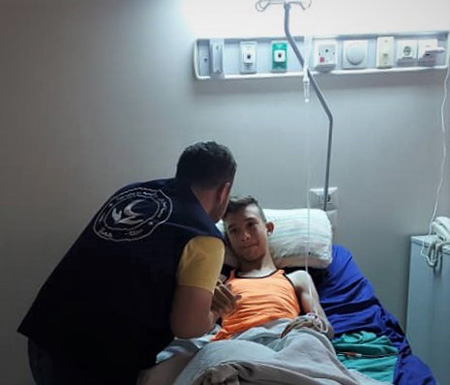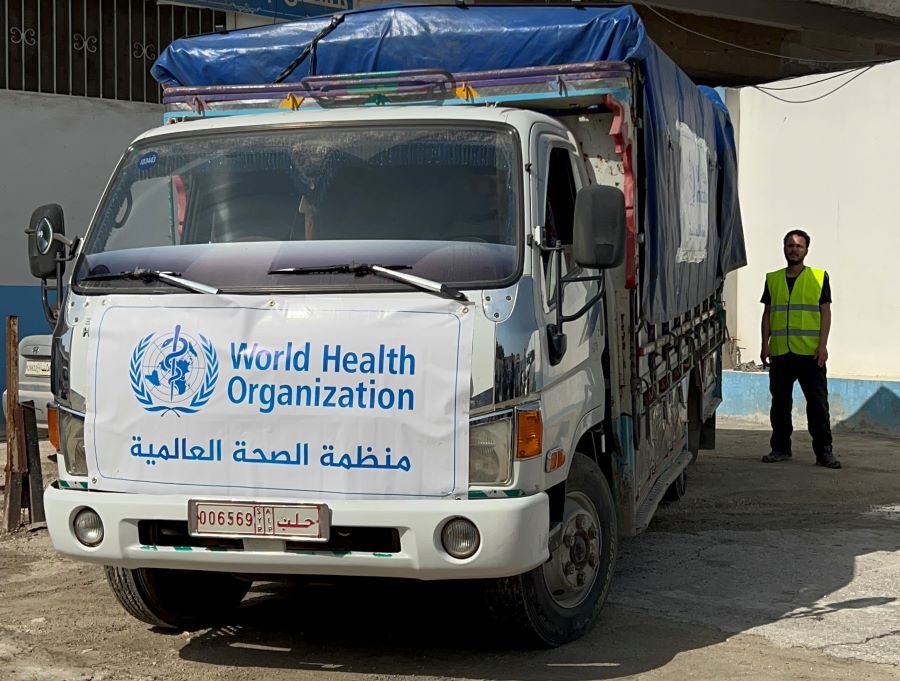World Health Day 2023: achieving health for all

Damascus, Syria – On 7 April 2023, the World Health Organization (WHO) celebrates the 75th anniversary of its establishment, coinciding with the annual observance of World Health Day. This day highlights WHO’s unwavering commitment to improving global health and recognizes the invaluable contributions of health care workers who tirelessly provide essential health services to communities worldwide, even under challenging circumstances.
WHO Representative in Syria a.i. Dr Iman Shankiti and H.E. Minister of Health Dr Hassan al-Ghabbash visited a polyclinic in Damascus to mark the day and express their appreciation for the selfless efforts of health care professionals in Syria who have been delivering vital services to the Syrian people despite the protracted crisis. This visit serves as a powerful reminder of the critical role that health workers play in ensuring that everyone has access to quality health care, particularly in times of hardship.
Access to health care is a fundamental human right that should be available to all individuals without any financial barriers. Despite ongoing conflicts, socioeconomic crises, insecurity, sanctions, disease outbreaks, the recent earthquakes, and lack of access to some areas, WHO in Syria is supporting the Ministry of Health to lead the health response. WHO is playing a crucial role in empowering and enhancing the Ministry’s capacity to provide essential health care and ensuring the provision of life-saving and life-sustaining services to the people of Syria.
“This year’s World Health Day theme, “Health for All”, highlights the importance of ensuring that everyone has access to quality health services. WHO and the Ministry of Health are working closely together to move towards universal health coverage by adapting the health care system to be resilient, accessible, and of good quality. They are also working to protect people from emergencies by strengthening national and subnational preparedness and response, including for humanitarian response, outbreak response, and the International Health Regulations,” Dr Shankiti said.
On this World Health Day, WHO is calling on the international community to do more to achieve health for all in Syria and other countries affected by conflict and crisis. This means investing in health systems, ensuring access to essential medicines and vaccines, and supporting the mental health and well-being of affected populations.
Join us on this 7 April in celebrating World Health Day and WHO’s 75th anniversary by taking action to achieve health for all. Together, we can create a world where everyone can attain their full health potential.
Long-standing EU support continues to enable life-saving WHO response in Syria
 4 April 2023 ̶ Thanks to humanitarian funding of the European Union, 15-year-old Mohammad is once again a successful student with a dream to make a difference in the world by becoming a doctor who provides healthcare to those who need it most.
4 April 2023 ̶ Thanks to humanitarian funding of the European Union, 15-year-old Mohammad is once again a successful student with a dream to make a difference in the world by becoming a doctor who provides healthcare to those who need it most.
Most parents find their teenage boys to be a handful. In Salamiyah, however, an ancient Syrian town in Hama governorate, one set of parents would beg to differ: their son Mohammed was a curious, active, 15-year-old, with a passion for learning, driving his engagement as a high school student. That is, until the family was blindsided by a sharp pain in Mohammad’s feet that made walking increasingly difficult until he was forced to leave school. Already struggling to make ends meet due to severe socio-economic decline, Mohammad’s parents were as devastated by his sudden illness as by their lack of resources to provide their son with the medical care he urgently needed.
Desperately trying to find help, Mohammad’s parents approached the WHO-supported Al Bir and Al Ihsan NGOs where doctors performed his necessary surgery. After months of physical therapy sessions, Mohammad made a full recovery and was finally able to return to school. With the full support and encouragement of his family and teachers, Mohammad managed to catch up and get his education back on track.
“The enduring crisis in Syria has given rise to a complex and protracted humanitarian emergency, characterized by an estimated 15.3 million people in dire need of critical medical assistance. The disrupted health system is incapable of sufficiently catering to their requirements, owing to extensive devastation, insufficient resources, and inadequate healthcare access,” said Dr Iman Shankiti, WHO Representative a.i. in Syria. “We are grateful for the EU’s generous contributions for 10 years now. They have made a vital difference in tackling acute health gaps and further scaling up WHO’s efforts to reach every person in need across the country,” Dr Shankiti added.
Over the last decade, the EU’s humanitarian support of more than EURO $ 63 million has played a crucial role in strengthening WHO’s response to the crisis in Syria, enabling the provision of life-saving and life-sustaining assistance to the most vulnerable population, and ensuring that essential health services are maintained in the country. EU humanitarian support has been instrumental in improving the health outcomes of countless individuals affected by the ongoing conflict, including the next generation of children like Mohammad.
Ministry of Health and WHO conclude JEE self-evaluation workshop to enhance health security

Damascus – The Ministry of Health of the Syrian Arab Republic and the World Health Organization (WHO) collaborated during a 4-day workshop aimed at enhancing the country’s health security through the self-assessment of International Health Regulations (IHR) 2005 core capacities under the Joint External Evaluation (JEE) Framework. Held from 12 to 15 March 2023, the workshop fostered multisectoral collaboration among stakeholders from national and sub-national levels to improve health security in Syria.
The JEE is a voluntary and collaborative process aimed at assessing a country's core capacities to prevent, detect, and respond to public health threats under the IHR 2005. This process helps countries identify critical gaps in their human and animal health systems, allowing them to prioritize opportunities to enhance preparedness and response to public health emergencies.
"The 2019 JEE session provided a crucial foundation for this workshop, which represents a significant step forward in developing a comprehensive roadmap for enhancing Syria’s health response to the ongoing crisis. Through the collaborative efforts of WHO and the Ministry of Health, we aim to build capacity and strengthen preparedness to effectively manage public health emergencies. WHO is committed to working with all partners to ensure that the people of Syria have access to the health care services they need and deserve," said Dr Iman Shankiti, WHO Representative in Syria.
The workshop included technical presentations, group work, and plenary discussions covering the 19 technical areas of the JEE. Participants from various sectors, including food safety, zoonotic diseases, environmental health, and points of entry, attended the workshop.
"Facilitating the intermediation of IHR and JEE, this workshop identified strengths and gaps to ensure minimum capacity for early detection, investigation, and response to public health. The discussion was open, and all participants were keen to improve the health situation and pursue global health security," said Dr Dalia Samhouri, WHO Emergency Preparedness and International Health Regulations Regional Manager.
As a result of the self-assessment workshop, the Syrian Ministry of Health and WHO have identified several areas of improvement. These recommendations include reviewing and updating legislation, involving the private health care sector and civil society organizations in ensuring health security, accelerating the formation of the General Food Safety Authority and the National Food Safety Council, and adopting a comprehensive national plan for infection prevention and control, among others.
A major outcome of the self-assessment workshop is the planned Joint External Evaluation mission scheduled to take place in May 2023. This mission will assess the country’s progress in addressing the identified gaps and implementing the recommendations made during the self-assessment workshop.
WHO and Ministry of Health collaborate to enhance Syria’s medical supply chain

21 March 2023, Damascus, Syria - The World Health Organization (WHO) has partnered with the Ministry of Health in Syria to hold a workshop, which, starting yesterday, aims to assess the national medical supply chain. This critical initiative will review essential processes, analyse distribution mechanisms and provide strategic solutions to establish a national logistics management system.


